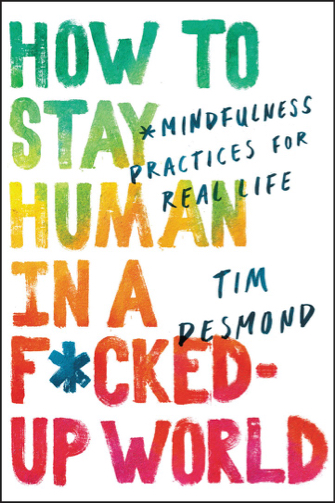Trends We’re Watching in Publishing: Nonfiction grows; religious voices diversify; covers matter and offensive language rises
The Front Edge Publishing team follows industry magazines, newsletters and social media on a daily basis—but many of these sources, including Publishers Weekly (PW) magazine and some analytical newsletters, are only visible to subscribers. So, from time to time, we share news items and trends in these weekly columns.
Here are four news items relevant to our authors
Real-person insight
into spirituality

Real-person insightinto spirituality has been a hallmark of our publishing house for many years. This book by Rodney Curtis is filled with sometimes hilarious and sometimes deeply thoughtful stories of this journalist’s experiences at home and abroad. Click the cover to visit the book’s Amazon page.
Front Edge was founded with a commitment to publish important books that, overall, celebrate diversity. Good media builds healthy communities,
we say. A significant portion of our books are about the importance of religion and spirituality—and a number of those books are by authors who are not traditional scholars.
These writers have what Dave Lewis calls real-person insight.
Lewis is a towering figure in Christian publishing, particularly in Michigan where Front Edge is based. He recently retired after more than four decades in the business. He had been executive vice president of sales and marketing at Baker Publishing, and PW magazine interviewed him about trends.
One startling insight he shared—given that Baker has a longstanding focus on traditional religious authors—is a recommendation that publishers look for the next wave of popular spiritual writers, even if those authors don’t have a formal educational background in religious studies.
What’s most important? Lewis says it’s the real-life authenticity of the writer and that writer’s ability to tell a compelling story. Religious publishing is no longer the exclusive club of famous preachers and teachers. Readers want books that match their faith journey.
It makes you wonder who the next biggest author could be—it could be anyone,
Lewis tells PW.
Nonfiction continues to grow
Most authors we talk with are surprised to learn that, every year, more nonfiction books are sold than fiction.
You mean with all those best-selling murder mysteries and romances and mega-best-sellers like Harry Potter—nonfiction actually outsells fiction?
Yes. It’s true, and PW‘s latest trend report concluded that nonfiction boosts Unit Sales 2.6 percent in mid-May
—meaning that continually rising sales of adult trade nonfiction
(the category in which we specialize) buoyed the entire publishing industry compared with sales one year ago.
Jane Friedman: Don’t crowdsource your covers
Industry pioneer and publishing guru Jane Friedman is famous for busting myths, spotting important trends and generally disrupting business as usual.
In a recent issue of PW‘s BookLife, Jane took aim at the trend among authors to crowdsource the cover designs for their books. As usual, she put it bluntly:
Those crowdsourced opinions have an approximate value of zero in determining the best cover.
Why?
- The crowd hasn’t been part of the book’s big-picture marketing and packaging discussion.
- That crowd doesn’t represent real readership.
- Cover disagreements with the publisher shouldn’t be taken to the crowd for a verdict because it complicates and slows down the process.
She concludes:
Though there are many areas of writing and publishing in which it can be helpful to brainstorm and solicit feedback from within one’s social circles, an author’s most important marketing tool (the cover) shouldn’t be left to a random vote.
Pushing the boundaries of R-rated language
Publishers of books about religious and cultural diversity are watching the emergence of R-rated language in prominent places within new books. The goal among authors pushing this issue is relevance with young adult readers who casually use this language. The problem is that such titles could backfire among readers offended by crude terms. One disruptor in this niche is Nadia Bolz-Weber, who plays a role in this week’s ReadTheSpirit magazine cover story. Nadia uses the f-word for emphasis when she preaches; and such language appears in her very popular books, even in chapter titles.
PW reports that more new books are pushing this linguistic envelope. This summer, Mark Manson’s Everything Is F*cked: A Book about Hope is causing quite a stir with robust sales since its release on . We also note that Manson, who describes himself as an entrepreneur,
knows a great catchphrase when he sees one. His best-seller was The Subtle Art of Not Giving a F*ck: A Counterintuitive Approach to Living a Good Life. With his new book, he’s following what he believes is a proven formula, right down to the f-word on the cover.

Should we allow this language in our book titles with spiritual
themes? It’s debatable and the evidence, so far, is both limited and mixed (see the AP news item below).
Nadia certainly is a popular religious writer. Is Manson religious
? No. Is he spiritual
? Maybe. Manson describes himself as an entrepreneur
and is best known as a self-help
writer, which usually is regarded as a genre separate from religion-spirituality.
But—remember what Dave Lewis said about real-person insight
on spirituality in today’s first news item? Manson could easily be described as exploring a spiritual approach to life’s basic questions.
He’s not that much different, as a writer, than Tim Desmond—who describes himself primarily as an expert in professional psychology.
Tim also is a Buddhist following the teachings of Thich Nhat Hanh. Spiritually, then, Manson and Desmond look like first cousins. That may be why HarperOne, which specializes in spiritual publishing, chose to title Tim’s new book, due out in : How to Stay Human in a F*cked-Up World.
Associated Press Stylebook Opposes This Trend
One benchmark on what the vast majority of American readers expect is the Associated Press (AP) Stylebook , which was just released this month (). This massive guide to writing for general readers draws on input from thousands of editors and readers nationwide and establishes the rules for major newspapers and magazines. At Front Edge Publishing, we follow AP style as a baseline for editing so that our readers find our books comfortably adapted to their preferences. We do make many exceptions, however.
What does AP say about obscenities, profanities, vulgarities
?
The actual entry fills most of a page in the new Stylebook. Here are highlights:
Do not use them in stories unless they are part of direct quotations and there is a compelling reason for them. … If the obscenity involved is particularly offensive but the story requires making clear what the word was, replace the letters of the offensive word with hyphens using only an initial letter: f—, s—.
In 2019, the Front Edge team is increasingly seeing new manuscripts pushing hard on this issue. At this point, we don’t have a definitive ruling for our copy editors.
Got suggestions or questions about this—or any of the news items in this column?
Email me at [email protected]